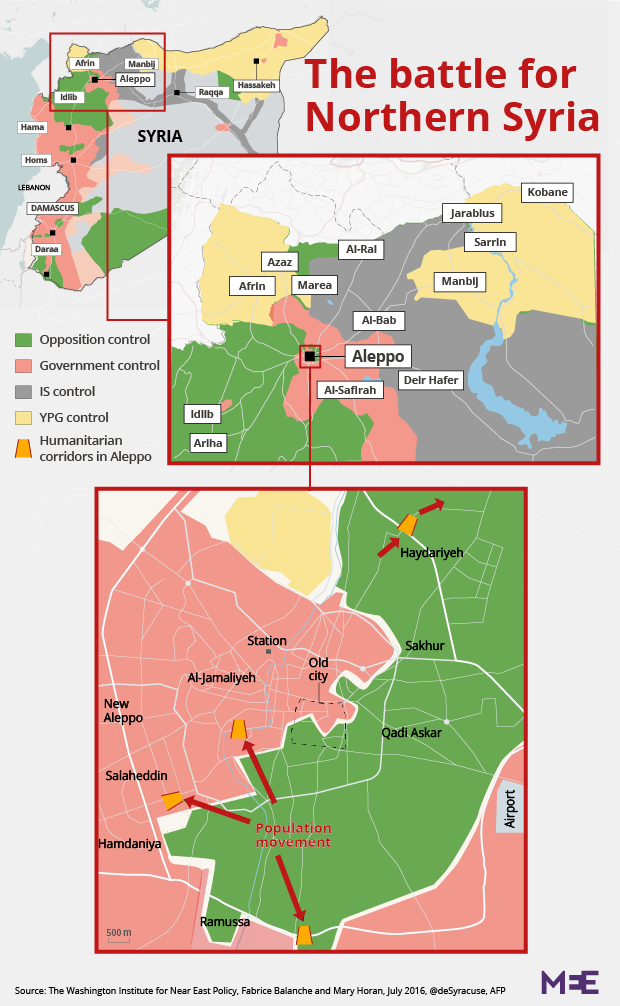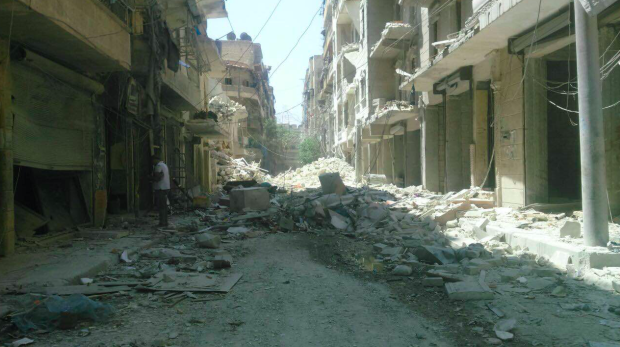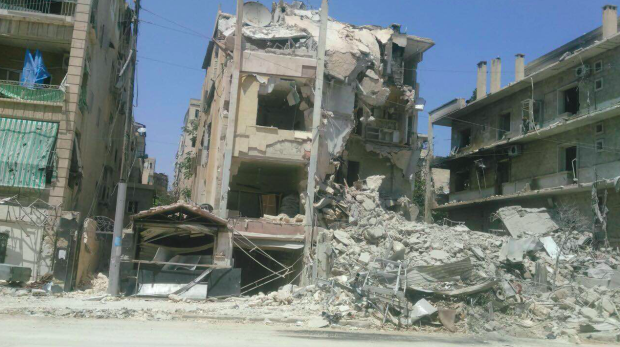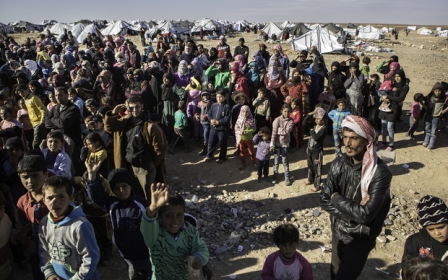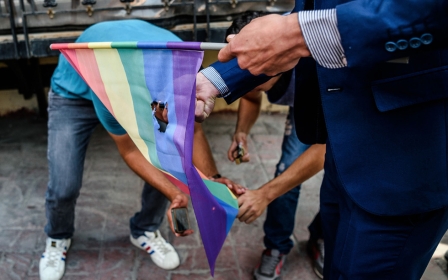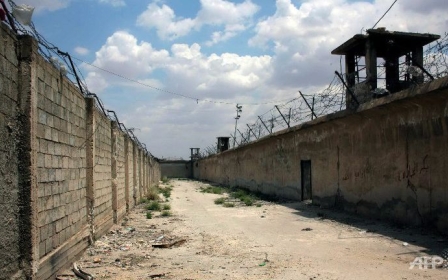Syrian rebels face intense bombing, still vow to break siege of Aleppo
ALEPPO, Syria – Rebel fighters in Aleppo say they have faced an unprecedented bombing campaign as they try to turn the tables on pro-government forces in a counter-offensive to break out of the besieged eastern parts of the city.
Rebel groups told Middle East Eye on Thursday they can break the siege in spite of a renewed government offensive that aims to recapture lost ground.
Ahmad Omar, a Free Syrian Army field commander who has fought against pro-government troops and Jabhat Fateh al-Sham - formerly the Nusra Front and until recently al-Qaeda's Syrian affiliate - said his forces were launching daily counter-attacks on the Ramussa frontline in southern Aleppo.
Omar said that his men were also fighting in the neighbouring district of Hamdania and that they had re-taken control of it earlier this week after killing more than 40 pro-government fighters and their Hezbollah allies. Fierce gun battles raged for hours as the rebels fought to gain control of the key strategic area, he said.
“The warplanes have never stopped since we announced our march [on Monday],” Omar told MEE.
“We took many areas on the first day and it was a kind of a shock to them [the pro-government forces], so they went on a shooting frenzy and even shot their own frontline in Hamdania twice by mistake.”
While Omar's forces engage government fighters in southwestern Aleppo, other rebel factions are trying to advance north from the rebel-held countryside to the south, with the aim of meeting in the middle and leaving Syrian government soldiers stranded in a small pocket and isolated from reinforcements.
The rebel counter-offensive could grind to a halt if the government siege cuts supplies of fuel, weapons and ammunition, although supplies from Turkey are reaching them via rebel advances north of Aleppo, fighters said.
“We are all working to attack the same area so that we can fully surround government troops in a circle and put the regime under siege, just like they did to us,” Omar said.
Pro-government forces, along with their Russian allies, besieged eastern Aleppo in mid-July after months of heavy fighting with different rebel groups. Since then, food and medical supplies have been restricted, raising fears that east Aleppo could become one of the greatest humanitarian catastrophes in recent memory.
Hassan Abo al-Eiz, a fighter with Kataeb Thuwar al-Sham, a group seen as moderate by the US, said his men had recently been able to hit government-controlled areas and were making progress.
“We launched an offensive to take the Hamdania area, which is located in western Aleppo and has been held by the regime since the start of the uprising,” Eiz said.
“We will keep going to take the whole area, including a missile factory in Ramussa and Assad’s academy," a small military base in the area that houses Hezbollah and Iraqi pro-government fighters.
“This is a very big aim for us, and while we face lots of obstacles, we will keep going and we will complete what we have started."
“I know it's tough and that the regime has jets and helicopters, which we don’t, but we will liberate western Aleppo as we have sworn to do since the beginning of the revolution,” he said.
While the Russians announced last week that they would open humanitarian corridors for civilians to cross over to the government-held side, hardly anyone has been able to do so. According to the UN, as many as 300,000 civilians remain trapped in east Aleppo.
The Syrian government said rebels are stopping people from crossing into safety, but many residents said they fear they will be imprisoned or forcibly conscripted if they cross over.
For all the bravado of the rebels trapped in east Aleppo, weapons and ammunition are increasingly in short supply. Fuel has also all but run out. Still, rebel forces trying to advance north from outside Aleppo have been able to resupply from Turkey. Rebels told MEE they hope this drive will divert attention from the government's northern front in Aleppo and give the rebels a fighting chance.
While the widespread destruction of medical facilities and hospitals by government air strikes has severely limited the ability to treat fighters, rebels said the strikes have not greatly impacted their fighting strength.
According to the Syrian Institute for Justice, an Aleppo-based NGO, hundreds of civilians in rebel-held parts of Aleppo have been killed in the three weeks since the siege began. Rebel forces have also inflicted civilian casualties, reportedly killing at least 30 civilians so far this week in shelling attacks on Aleppo's government-held areas.
“The city is constantly being hit with regime warplanes and helicopters with barrel bombs," Eiz said. "But thank God this has not impacted our fighters severely.”
“Compared to the number of raids and the barrel bombs they have dropped on us, we have seen relatively little damage and loss until now.”
Civilians are bearing the brunt of the siege.
Khaled Shawa, a resident of al-Ansari Mashhad in eastern Aleppo, said the bombing is worse than ever.
“Last night [Wednesday night] was really rough,” Shawa said. “I have never experienced anything this bad in my area before, not once since the revolution began in 2011.
“I thought the regime was about to occupy the area and that is why Assad was doing so much bombing. It continued all night, but in the end the regime didn’t even try to occupy the area; they just bombed.
“A building near me was hit. I wanted to go down and help, to see do what I could, but I didn't dare step out onto the street. Even the civil defence and the ambulances couldn’t go, and they just waited until the bombing stopped. It lasted more than four hours.” According to Shawa, several buildings, as well as a two local mosques, were partially or totally destroyed, and at least eight civilians were killed in his neighbourhood.
“It was night, so we didn't get a chance to see what was happening, but after daybreak residents were shocked by the amount of damage,” he said. “Considering the amount of rockets and barrel bombs, we actually have not suffered huge losses and have weathered the assault relatively well, but it was an unforgettable night.”
More than 280,000 people have been killed in Syria and more than half its population has been displaced since the conflict began with the brutal repression of anti-government protests in 2011.
New MEE newsletter: Jerusalem Dispatch
Sign up to get the latest insights and analysis on Israel-Palestine, alongside Turkey Unpacked and other MEE newsletters
Middle East Eye delivers independent and unrivalled coverage and analysis of the Middle East, North Africa and beyond. To learn more about republishing this content and the associated fees, please fill out this form. More about MEE can be found here.


